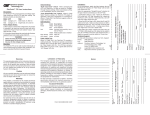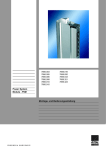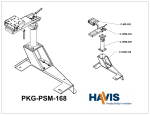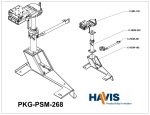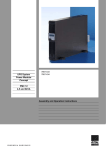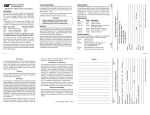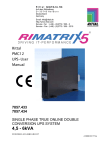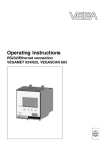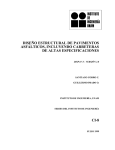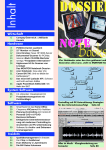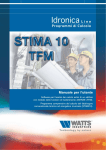Download Assembly and operating instructions Power System Module
Transcript
7856.003 7856.005 7856.006 7856.008 7856.010 7856.015 7856.016 7856.020 7856.043 7856.321 7856.323 Power System Module - PSM Assembly and operating instructions We reserve all rights for this technical documentation. Without our previous consent it must neither be reproduced nor made available for third parties. Nor must it be put to any other misuse by the receiver or third parties. Any violation of the above obliges the violating party to pay compensation and may lead to penal action. Microsoft Windows is a registered trademark of Microsoft Corporation. Acrobat Reader is a registered trademark of Adobe Systems Incorporated. EN Table of Contents 1. Documentation Notes................................4 11. Mounting of the Lockout ......................... 28 12. Maintenance ........................................... 29 RETENTION OF THE DOCUMENTS ................. 4 USED SYMBOLS.......................................... 4 13. Cleaning ................................................. 29 2. Safety Notes .............................................4 15. Accessories for PSM Bus bars ............... 30 3. Introduction ...............................................5 4. Service and Service Address ....................5 15.1. 7856.003, 7856.005, 7856.006, 7856.008, 7856.010, 7856.020, 7856.016, 7856.043, 7856.321 AND 7856.323..................................... 30 15.2. 7856.015 ............................................... 30 15.3. 7856.003, 7856.005, 7856.006, 7856.008, 7856.010, 7856.015, 7856.016, 7856.020, 7856.043, 7856.321 AND 7856.323.................... 30 15.4. 7856.010, 7856.016, 7856.020, 7856.008 31 1.1. 1.2. 5. PSM Power System Module .....................6 5.1. 5.2. 5.3. 5.4. 5.5. 5.6. 6. PSM with fixed infeed..............................10 6.1. 6.2. 6.3. 6.4. 7. 9. SCOPE OF SUPPLY ................................... 10 FEATURES ............................................... 10 CONFIGURATION ...................................... 10 OPTIONAL ACCESSORIES .......................... 11 16.1. 32 16.2. TECHNICAL SPECIFICATIONS – PSM BUS BAR SCOPE OF SUPPLY ................................... 12 FEATURES ............................................... 12 CONFIGURATION ...................................... 12 OPTIONAL ACCESSORIES .......................... 13 WIRING DIAGRAM ..................................... 14 Metered PSM ..........................................15 17. Assembly Instructions............................. 38 8.1. SCOPE OF SUPPLY ................................... 15 8.2. FEATURES ............................................... 15 8.3. CONFIGURATION ...................................... 15 8.4. OPTIONAL ACCESSORIES .......................... 16 8.5. DESCRIPTION........................................... 16 8.6. CONFIGURATION OF THE METERED PSM .. 18 8.7. CONNECTION TO THE CMC-TC ................ 19 8.7.1. Associated documents .................. 19 8.7.2. Commissioning .............................. 19 8.8. WIRING DIAGRAM ..................................... 22 17.1. MOUNTING IN THE RITTAL FLEXRACK(I)..... 40 17.2. MOUNTING IN RITTAL TS ENCLOSURES ..... 41 17.2.1. Mounting in Rittal TS enclosures, base and roof frames .................................... 42 17.2.2. Mounting in Rittal TS enclosures, punched mounting sections .......................... 43 17.3. MOUNTING IN RITTAL TE ENCLOSURES ..... 43 17.4. MOUNTING THE PLUG-IN MODULES ............ 44 17.5. INFEED STRAIN RELIEF (SUGGESTION)....... 45 17.6. ALTERNATIVE POSSIBILITIES FOR MOUNTING OF THE CABLE CLAMP BRACKET ............................ 46 17.7. ALTERNATIVE POSSIBILITIES FOR MOUNTING OF THE CABLE CLAMP BRACKET ............................ 46 PSM Plus ................................................12 PSM Version 32 A, Single-Phase ...........23 9.1. 9.2. 9.3. 9.4. 9.5. 9.6. SCOPE OF SUPPLY ................................... 23 FEATURES ............................................... 23 CONFIGURATION ...................................... 23 OPTIONAL ACCESSORIES .......................... 23 FUNCTION PRINCIPLE ............................... 24 WIRING DIAGRAM ..................................... 25 10. Power System Module with a 32 A Infeed 26 10.1. 10.2. 10.3. 10.4. 10.5. 2 16. Technical Specifications ......................... 32 TECHNICAL SPECIFICATIONS – PSM WITH FIXED INFEED....................................................... 33 16.3. TECHNICAL SPECIFICATIONS – PSM PLUS WITH 4-WAY INFEED ............................................. 34 16.4. TECHNICAL SPECIFICATIONS – PSM BUS BAR WITH 3-PHASE CURRENT MEASUREMENT ............... 35 16.5. TECHNICAL SPECIFICATIONS – PSM 32 A, SINGLE-PHASE ..................................................... 36 16.6. TECHNICAL SPECIFICATIONS – PSM 32 A, 3PHASE 37 7.1. 7.2. 7.3. 7.4. 7.5. 8. SCOPE OF SUPPLY ..................................... 6 FEATURES ................................................. 6 CONFIGURATION ........................................ 6 OPTIONAL ACCESSORIES ............................ 7 FUNCTION PRINCIPLE ................................. 8 WIRING DIAGRAM ....................................... 9 14. Disposal.................................................. 29 18. Electrical Connection of the Bus bar ...... 47 18.1. 18.2. 18.3. TECHNICAL DATA OF THE INFEEDS ............ 47 EARTHING ............................................... 48 INFEED CONNECTION PLUG, DATA AND ASSIGNMENT ....................................................... 49 18.4. TERMINAL ASSIGNMENT............................ 49 SCOPE OF SUPPLY ................................... 26 FEATURES ............................................... 26 CONFIGURATION ...................................... 26 OPTIONAL ACCESSORIES .......................... 26 WIRING DIAGRAM ..................................... 27 PSM Power System Module empty page EN PSM Power System Module 3 Documentation Notes EN 1. Documentation Notes 2. Safety Notes The audience for this guide is the technical specialists familiar with the assembly, installation and operation of the Rittal PSM. • You should read this operating guide prior to the commissioning and store the guide so it is readily accessible for subsequent use. Rittal cannot accept any liability for damage and operational malfunctions that result from the non-observance of this guide. Observe the subsequent general safety notes for the installation and commissioning of the unit: - Assembly and installation of the Rittal PSM, in particular for wiring the enclosures with mains power, may be performed only by a trained electrician. Other tasks associated with the Rittal PSM, such as the assembly and installation of system components with tested standard connectors, and the operation and configuration of the Rittal PSM may be performed only by instructed personnel. - Observe the valid regulations for the electrical installation for the country in which the unit is installed and operated, and the national regulations for accident prevention. Also observe any companyinternal regulations (work, operating and safety regulations). - Prior to working at the Rittal PSM system, it must be disconnected from the power supply and protected against being switched on again. - An electrical test must be performed after the completion of the assembly, installation and maintenance work! All protective conductor terminals and the voltages at all connection plugs, and at each individual module slot must be checked. - Use only genuine or recommended parts and accessories (see Chapter 15). The use of other parts can void the liability for any resulting consequences. - Do not make any changes to the Rittal PSM that are not described in this guide or in the associated guides. - The operational safety of the unit is guaranteed only for its approved use. The limit values stated in the technical specifications (see Chapter 16) may not be exceeded under any circumstances. In particular, this applies to the permitted ambient temperature range and to the permitted IP protection category. When used with a higher required IP protection category, the Rittal PSM must be installed 1.1. Retention of the documents This guide and all associated documents are part of the product. They must be given to the operator of the unit and must be stored so they are available when needed. 1.2. Used symbols The following safety and other notes are used in this guide: Symbol for a handling instruction: • This bullet point indicates that you should perform an action. Safety and other notes: Danger! Immediate danger to life and limb! Warning! Possible danger for the product and the environment! Note! Useful information features. 4 and special PSM Power System Module Introduction in a housing or enclosure with a higher IP protection category. - - - Operation of the Rittal PSM system in direct contact with water, aggressive media, or inflammable gases and fumes is prohibited. In addition to these general safety notes, also observe any special safety notes listed for the specific tasks in the individual sections. The strain relief for the connection cable must be made in the immediate vicinity of the connection plug of the PSM bus bar. If the strain relief bracket cannot be attached to the base frame, a suitable punched section must be installed for the mounting of the strain relief bracket. various country-specific versions. Rittal does not accept any warranty for any other uses of PSM buses. 4. Service and Service Address If you have any questions concerning technical or other issues related to our product range, Rittal will be pleased to provide any required support. You may contact us at the address indicated below. Rittal GmbH & Co. KG Auf dem Stuetzelberg D-35745 Herborn Germany E-mail: [email protected] 3. Introduction Note! The stable flow of information and production is the 'lifeline' of an enterprise. Loss of data, failure of function and production causes extensive and in many cases life-threatening damage. Therefore, it is the declared company objective to ensure a maximum of safety and reliability. Rittal offers support to achieve this: By means of universal competence in effective prevention, comprehensive safety, and centralised organisation, i.e. teamwork for IT safety and reliability! This result is an optimum combination of power management and administration, enclosure monitoring, server administration and climate control components. Please indicate always the item number in the reference line. Support Tel.: Complaints: Fax: +49 (0) 2772/505-9052 +49 (0) 2772/505-1855 +49 (0) 2772/505-2319 Further information concerning the Rittal PSM can be downloaded from the RimatriX5 homepage www.rimatrix5.com The solution for the power management is the Rittal PSM – Power System Module. This concept includes complete power distribution of the enclosure, i.e. power supply, distribution and protection. The PSM offers a revolutionary energy management for IT racks. The modular power supply system permits the power supply using a vertical bus bar on which the power system modules are simply clipped. The system is made complete by its sophisticated modular structure. A basic installation can be implemented in next to no time. When demands then grow over time, the original system can simply be expanded with further plug-in modules, also available in PSM Power System Module 5 EN PSM Power System Module EN 5. PSM Power System Module Model No.: DK 7856.010 Model No.: DK 7856.020 Model No.: DK 7856.008 (for 2200mm Racks) VDE Reg. No. A592 Tested and certified in accordance DIN EN 60950 (VDE 0850):2000-12. with Danger! An electrical test must be performed after the completion of the assembly, installation and maintenance work! All protective conductor terminals and the voltages at all connection plugs, and at each individual module slot must be checked. 5.1. Scope of supply 1 x bus bar 2 x female multipoint connection strip 1 x operating instructions 1 x cable bracket, incl. assembly parts 5.2. Features - Shock-hazard-protected design, i.e. it is not necessary to configure the whole bus bar at once - Modular design for simple installation - Optimised cable management - Complete compatibility with Rittal enclosure systems 5.3. Configuration The vertical bus bar is an H-shaped aluminium section. The power distribution for the individual plug-in modules is realised in the rear, concealed section. The bus bar can be clipped directly into the vertical enclosure frame members of Rittal flexRack(i), or else retrofitted to other existing racks. To upgrade TS enclosures you require the DK 7856.022 or DK 7856.023 mounting kit and for TE enclosures the DK 7000.684 PSM adaptor. Once the bus bar is fitted in the enclosure, a voltage supply must be provided in a suitable form. This can be done either by way of a three-phase connector, e.g. IEC309 16 A, or with permanent wiring to the plug-in terminal strips provided on the bus bars. Connecting lines are available as Rittal accessories. The principal features of the Rittal PSM are: Warning! - Two separate 3~ infeeds, redundant configurations - 96 A current in total, i.e. 48 A per infeed - Four plug-in modules can be accommodated on a 1200 mm bus bar, which corresponds to 24 IEC 320-C13 appliance sockets The strain relief for the connection cable must be made in the immediate vicinity of the connection plug of the PSM bus bar. If the strain relief bracket cannot be attached to the base frame, a suitable punched section must be installed for the mounting of the strain relief bracket. - Seven plug-in modules can be accommodated on a 2000 mm bus bar, which corresponds to 42 IEC 320-C13 appliance sockets - - 6 permitting Eight plug-in modules can be accommodated on a 2200mm bis bar, which corresponds to 48 IEC 320-C13 appliance sockets Various country modules, UK, USA, F/B, earthing-pin plug, IEC 320-C13/C19 appliance sockets Note! Observe the correct fuse values!! Refer to the notes on the rating plate. The plug-in modules can now be clipped onto the bus bar in the desired positions. The modules are locked into place using the lugs on the end faces. A module can only be released from the bus bar after it has been unlocked. PSM Power System Module PSM Power System Module To unlock a module, the lugs on the end faces must be pressed down at the same time at both ends. The module can then be pulled off the bus bar. EN The connection direction of the modules is used to select infeed I or II Condition: All infeeds must be connected by the customer. For information about assembly and connection of the bus bar please see Chapters 17 and 18. All important operating parameters, such as application limit temperature and humidity, allowed voltage supply, back-up fuses, etc., are described in more detail in Chapter 16.1 5.4. Optional accessories Note! Article numbers, see Chapter 15. - 3~ over voltage protection - Various country-specific plug-in modules - DK 7856.025 or DK 7856.026 connection cable PSM Power System Module 7 PSM Power System Module EN 5.5. Function principle The diagram shows circuit A and circuit B of a 2000 mm strip. Fig. 1: Function principle The red arrow on the PSM module points up The black arrow on the PSM module points up B infeed A infeed For single-phase 32 A infeed, the B circuit must be protected using a 16 A class C circuit breaker. For single-phase 32 A infeed, the A circuit must be protected using a 16 A class C circuit breaker. 8 PSM Power System Module PSM Power System Module 5.6. Wiring diagram EN The diagram shows infeed I and infeed II of a 2000 mm and a 1200 mm strip M odul 7 Modul4 M odul 6 Modul3 M odul 5 Modul2 M odul 4 Modul1 M odul 3 L1 L2 L3 N PE M odul 2 PE N L3 L2 L1 C ircuit 1 C ircuit 2 Power System Module 400V Note! L1 L2 L3 N PE PSM Circuit2 400V Fig. 3: Wiring diagram Rittal PSM 1200 mm M odul 1 400V Fig. 2: Wiring diagram Rittal PSM 2000 mm PE N L3 L2 L1 Circuit1 The wiring of the 2200mm Model has the same plan, with one extra Slot for a PSM Module. 400V 9 PSM with fixed infeed EN 6. PSM with fixed infeed Model No.: DK 7856.005 (with one infeed) Model No.: DK 7856.006 (with two infeeds) VDE Reg. No. A592 Tested and certified in accordance DIN EN 60950 (VDE 0850):2000-12. with Danger! An electrical test must be performed after the completion of the assembly, installation and maintenance work! All protective conductor terminals and the voltages at all connection plugs, and at each individual module slot must be checked. 6.1. Scope of supply 1 x bus bar with fixed infeeds 1 x operating instructions 1 x assembly parts - Shock-hazard-protected design, i.e. it is not necessary to configure the whole bus bar at once - Modular design for simple installation - Optimised cable management - Complete compatibility with Rittal enclosure systems 6.3. Configuration The vertical bus bar is an H-shaped aluminium section. The power distribution for the individual plug-in modules is realised in the rear, concealed section. The bus bar can be clipped directly into the vertical enclosure frame members of Rittal flexRack(i), or else retrofitted to other existing racks. To upgrade TS enclosures you require the DK 7856.022 or DK 7856.023 mounting kit and for TE enclosures the DK 7000.684 PSM adaptor. The models 7856.005 and 7856.006 did have a fixed connection from the power cable to the bus bar, so it is no more possible to disconnect the plug on the bar and there is no need for a cable bracket. 6.2. Features The principal features of the Rittal PSM are: - Two separate 3~ infeeds, redundant configurations permitting Note! Model DK 7856.005 only got ONE 3~ infeed - 96 A current in total, i.e. 48 A per infeed The strain relief for the connection cable must be made in the immediate vicinity of the connection plug of the PSM bus bar. If the strain relief bracket cannot be attached to the base frame, a suitable punched section must be installed for the mounting of the strain relief bracket. Note! Note! Model DK 7856.005: 48A current in total Observe the correct fuse values!! Refer to the notes on the rating plate. - Seven plug-in modules can be accommodated on a 2000 mm bus bar, which corresponds to 42 IEC 320-C13 appliance sockets - Various country modules, UK, USA, F/B, earthing-pin plug, IEC 320-C13/C19 appliance sockets 10 Warning! PSM Power System Module PSM with fixed infeed The plug-in modules can now be clipped onto the bus bar in the desired positions. The modules are locked into place using the lugs on the end faces. A module can only be released from the bus bar after it has been unlocked. EN To unlock a module, the lugs on the end faces must be pressed down at the same time at both ends. The module can then be pulled off the bus bar. The connection direction of the modules is used to select infeed I or II (redundancy, see Section 5.5). Condition: All infeeds must be connected by the customer. Note! Model DK 7856.005 only got one infeed. So it does not matter in which direction you put in the modules For information about assembly and connection of the bus bar please see Chapters 17 and 18. All important operating parameters, such as application limit temperature and humidity, allowed voltage supply, back-up fuses, etc., are described in more detail in Chapter 16.2. 6.4. Optional accessories Note! Article numbers, see Chapter 15. - 3~ over voltage protection - Various country-specific plug-in modules PSM Power System Module 11 PSM Plus EN 7. PSM Plus Power System Module with 4 Infeeds Model No.: DK 7856.015 Designed in accordance with DIN EN 609501 (VDE 0805):2003-03. Danger! An electrical test must be performed after the completion of the assembly, installation and maintenance work! All protective conductor terminals and the voltages at all connection plugs, and at each individual module slot must be checked. 7.1. Scope of supply 1 x bus bar 1 x operating instructions 1 x cable bracket, incl. assembly parts 7.2. Features The principal features of the Rittal PSM Plus are: - Four separate 3~ infeeds, permitting redundant configurations - 192 A current available, 48 A per infeed - Six plug-in modules can be accommodated on a 2000 mm bus bar, which corresponds to 36 IEC 320-C13 appliance sockets - IEC 60320 C13, IEC 60320 C19 plug-in modules, and earthing-pin plug - Shock-hazard-protected design, i.e. it is not necessary to configure the whole bus bar at once - Modular design for simple installation - Optimised cable management - Full compatibility with Rittal enclosure systems 12 7.3. Configuration The vertical bus bar is an H-shaped aluminium section. The power distribution for the individual plug-in modules is realised in the rear, concealed section. The bus bar can be clipped directly into the vertical enclosure frame members of Rittal flexRack(i), or else retrofitted to other existing racks. To upgrade TS enclosures you require the DK 7856.022 or DK 7856.023 mounting kit and for TE enclosures the DK 7000.684 PSM adaptor. Once the bus bar is fitted in the enclosure, a voltage supply must be provided in a suitable form. This can be done either by way of a threephase connector, e.g. IEC309 16 A, or with permanent wiring. Connecting lines are available as Rittal accessories. Note! Observe the correct fuse values!! Refer to the notes on the rating plate. The plug-in modules can now be clipped onto the bus bar in the desired positions. They are locked into place by way of the lugs on the end faces. A module can only be released from the bus bar after it has been unlocked. To unlock a module, the lugs on the end faces must be pressed down at the same time at both ends. The module can then be pulled off the bus bar. Condition for the redundancy: All infeeds must be connected by the customer (see Section 7.5). For information about assembly and connection of the bus bar please see Chapters 17 and 18. All important operating parameters, such as application limit temperature and humidity, allowed voltage supply, back-up fuses, etc., are described in more detail in Chapter 16.3 PSM Power System Module PSM Plus 7.4. Optional accessories EN Note! Article numbers, see Chapter 15. - DK 7856.018 connection cable - 3~ over voltage protection - IEC 60320 C13, IEC 60320 C19 plug-in modules, and earthing-pin plug PSM Power System Module 13 PSM Plus EN 7.5. Wiring diagram Modul 6 Modul 5 Modul 4 Modul 3 Modul 2 Modul 1 L1 L2 L3 N PE L1 L2 L3 N PE L1 L2 L3 N PE L1 L2 L3 N PE Circuit 1 Circuit 3 Circuit 4 Circuit 2 400V 400V 400V 400V Fig. 5: PSM Plus wiring diagram 14 PSM Power System Module Metered PSM Note! 8. Metered PSM Power System Module with measuring function Model No.: DK 7856.016 (2 infeeds, 16A) Model No.: DK 7856.003 (1 infeed, 32A) - Six plug-in modules can be inserted on a 2metre bus bar; this corresponds to 36 IEC 320 appliance sockets - Shock-hazard-protected design, i.e. it is not necessary to configure the whole bus bar at once - IEC 60320 C13, IEC 60320 C19 plug-in modules, and earthing-pin plug - Modular design for simple installation - Optimised cable management - Full compatibility systems - Connection to the CMC-TC - Measurement and display on the current, voltage, power, work (energy), frequency display Designed in accordance with DIN EN 60950-1 (VDE 0805):2003-03. Danger! An electrical test must be performed after the completion of the assembly, installation and maintenance work! All protective conductor terminals and the voltages at all connection plugs, and at each individual module slot must be checked. Warning! To prevent damage to the Rittal Metered PSM, ensure that "N" and "L" for the infeed are not interchanged. Note! A power pack is required if the Metered PSM is not connected to the CMC-TC Processing Unit. Model number for the required power pack: DK7201.210, a connection cable is also required, see Chapter 15. 8.1. Scope of supply 1 x bus bar 1 x operating instructions 1 x cable bracket, incl. assembly parts 2 x female multipoint connection strip (7856.016) 1 x Connection cable wit CE-Plug, 32A (7856.003) 8.2. Features The principal features of Rittal Metered PSM are: - Two separate 3~ infeeds, redundant configurations - 96 A current available, 48 A per infeed PSM Power System Module EN The Model DK 7856.003 has just one singlephase Infeed and offers max. 32A. permitting with Rittal enclosure 8.3. Configuration The vertical bus bar is an H-shaped aluminium section. The power distribution for the individual plug-in modules is realised in the rear, concealed section. The bus bar can be clipped directly into the vertical enclosure frame members of Rittal flexRack(i), or else retrofitted to other existing racks. To upgrade TS enclosures you require the DK 7856.022 or DK 7856.023 mounting kit and for TE enclosures the DK 7000.684 PSM adaptor. Once the bus bar is fitted in the enclosure, a voltage supply must be provided in a suitable form. This can be done either by way of a three-phase connector, e.g. IEC309 16 A, or with permanent wiring. Connecting lines are available as Rittal accessories. Note! Observe the correct fuse values! Refer to the notes on the rating plate. 15 Metered PSM Warning! EN The strain relief for the connection cable must be made in the immediate vicinity of the connection plug of the PSM bus bar. If the strain relief bracket cannot be attached to the base frame, a suitable punched section must be installed for the mounting of the strain relief bracket. The plug-in modules can now be clipped onto the bus bar in the desired positions. They are locked into place by way of the lugs on the end faces. A module can only be released from the bus bar after it has been unlocked. 8.5. Description The Power System Module Metered PSM offers revolutionary power management for IT racks. The modular power supply system realises power input via a vertical mounting rail (bus bar) with a three-phase infeed. The individual Power System Modules are simply clipped to this rail. The Metered PSM bus bar provides the possibility to measure the voltage, current, power and energy per infeed and per phase. The mains frequency can also be measured per infeed. The Metered PSM bus bar also provides the possibility to set the upper and lower threshold values for voltage and current for each phase. To unlock a module, the lugs on the end faces must be pressed down at the same time at both ends. The module can then be pulled off the bus bar. Condition for the redundancy: All infeeds must be connected by the customer. For information about assembly and connection of the bus bar please see Chapters 17 and 18. All important operating parameters, such as application limit temperature and humidity, allowed voltage supply, back-up fuses, etc., are described in more detail in Chapter 16.4. 8.4. Optional accessories Note! Article numbers, see Chapter 15. - DK 7856.025 or DK 7856.026 connection cable - 3~ over voltage protection - Various plug-in modules - Connection to the CMC-TC 16 I/O port: connection Jog Dial on the CMC-TC or power pack LCD display Fig.6: Metered PSM The Jog Dial is used to configure the Metered PSM bus bar and to navigate through the display menu represented in the LCD display. The connection to the CMC-TC allows all parameters of the bus bar to be queried using a Web interface. The inclusion in a network management system using SNMP is also possible. If the Metered PSM bus bar is operated directly with a power pack, all values can be read from the display. The power pack is connected to the I/O port. A remote configuration and administration is not possible for operation with power pack for the Metered PSM bus bar. PSM Power System Module Metered PSM If the threshold value of the Metered PSM bus bar is undershot or overshot, the display flashes and the error message will be displayed at the lower edge. Infeed 1 EN Infeed 2 Fig.7: Metered PSM The angled plug connectors permit a parallel routing of the connection cable to the Metered PSM bus bar. Note! The Model DK 7856.003 has a fixed infeed with DIN-Bolting and a 32A CE-Plug.. PSM Power System Module 17 Metered PSM EN 8.6. Configuration of the Metered PSM Start display Select infeed by turning and confirm by pressing Infeed 1 Infeed 2 Select parameters by turning and confirm by pressing Only the measured values are displayed for the "Total" display Total Phase 1 Phase 2 Phase 3 Exit Total Energy (kWh) Power (kW) Frequency (Hz) Select parameters by turning and confirm by pressing Use "Exit" to return to start display Exit Phase 1/2/3 Energy (kWh) Power (kW) Voltage (V) Current (A) Set "high" and "low" setpoint for voltage or current by turning and confirm by pressing. Use "Exit" to leave the menu item. Display all parameters Use "Exit" to return to start display Exit Configuration of the display Press Jog Dial for more than 3 sec., then release to reach the configuration menu. Turn Jog Dial to change the value and confirm by pressing. Use "Exit" to leave the menu item. Circuit 1 Circuit 2 Circuit 1+2 Brightness Inverse Rotate Exit Use "Exit" to return to start display Sequence diagram 1: Configuration of the Metered PSM 18 PSM Power System Module Metered PSM EN 8.7. Connection to the CMC-TC 8.7.1. Associated documents The guide for the CMC-TC Processing Unit II (DK 7320.100) and its safety notes also apply together with this guide. You can download the German version of the guide from: http://www.rimatrix5.de/service_support/downlo ads.asp "Power" must be specified as product group. Here you find software updates for the metered PSM as well. To view the guide you require the Acrobat Reader program; Acrobat Reader can be downloaded from www.adobe.com 8.7.2. Commissioning The Metered PSM bus bar can be managed completely using the CMC-TC PU. The Metered PSM bus bar is connected directly with the sensor unit input of the PU. The bus bar is recognised automatically and immediately operational after confirmation of the changed configuration on the PU. The name of the Metered PSM bus bar is also used to send SNMP traps. Notification text Upper and lower threshold value Alarm management, see CMC-TC PU manual Fig.8: Tab 1 PSM Power System Module 19 Metered PSM EN Tabs 1 to 12 are constructed identically. Tabs 1 to 3 represent the L1, L2 and L3 voltages of infeed 1. Tabs 4 to 6 represent the current of infeed 1. Tabs 7 to 12 provide the values for infeed 2. Tab 13 provides the values for the power and the energy of infeed 1. Tab 14 provides this information for infeed 2. Fig.9: Tab 13 20 PSM Power System Module Metered PSM Tab 15 provides an overview for the voltage and current values of both infeeds and all phases. EN Fig.10: Tab 15 PSM Power System Module 21 Metered PSM EN 8.8. Wiring diagram 7856.016: 7856.003: Modul 6 Modul5 Messm odul Modul 4 Modul 3 Modul 2 Modul 1 L1 L2 L3 N PE PE N L3 L2 L1 Circuit 1 Circuit 2 400V 400V Fig. 11: Metered PSM wiring diagram 22 PSM Power System Module PSM Version 32 A, Single-Phase 9. PSM Version 32 A, SinglePhase Model No.: DK 7856.321 Model No.: DK 7856.043 (with integrated RCD) - Integrated fuses - Modular design for simple installation - Optimised cable management - Complete compatibility with Rittal enclosure systems Danger! An electrical test must be performed after the completion of the assembly, installation and maintenance work! All protective conductor terminals and the voltages at all connection plugs, and at each individual module slot must be checked. 9.3. Configuration The vertical bus bar is an H-shaped aluminium section. The power distribution for the individual plug-in modules is realised in the rear, concealed section. The bus bar can be clipped directly into the vertical enclosure frame members of Rittal flexRack(i), or else retrofitted to other existing racks. To upgrade TS enclosures you require the DK 7856.022 or DK 7856.023 mounting kit and for TE enclosures the DK 7000.684 PSM adaptor. 9.1. Scope of supply Note! 1 x bus bar with CEKON connection cable and connection plug 1 x operating instructions 1 x cable bracket, incl. assembly parts 9.2. Features The principal features of the Rittal PSM are: - A 1~ infeed with connection cable and CEE connection plug - 32 A current are available - Integrated protection using a 16 A, class C circuit-breaker - The Model 7856.043 has two integrated RCDs (Residual Current protectiv Devices) and allows the application in areas as described in DIN VDE 0100-410. EN Observe the correct fuse values! Refer to the notes on the rating plate. The plug-in modules can now be clipped onto the bus bar in the desired positions. They are locked into place by way of the lugs on the end faces. A module can only be released from the bus bar after it has been unlocked. To unlock a module, the lugs on the end faces must be pressed down at the same time at both ends. The module can then be pulled off the bus bar. The connection direction of the modules is used to select circuit/fusing A/F1 or circuit/fusing B/F2 For information about assembly and connection of the bus bar please see Chapters 17 and 18. - Six plug-in modules can be inserted on a 2metre bus bar; this corresponds to 36 IEC 60320 appliance sockets All important operating parameters, such as application limit temperature and humidity, allowed voltage supply, back-up fuses, etc., are described in more detail in Chapter 16.5 - Shock-hazard-protected design, i.e. it is not necessary to configure the whole bus bar at once 9.4. Optional accessories - Various country modules, UK, USA, F/B, earthing-pin plug, IEC 320-C13/C19 appliance sockets PSM Power System Module Note! Article numbers, see Chapter 15. - Over voltage protection - Various country-specific plug-in modules 23 PSM Version 32 A, Single-Phase EN 9.5. Function principle The diagram shows circuit A and circuit B of a 2000 mm strip. Fig. 12: Function principle 24 The red arrow on the PSM module points up The black arrow on the PSM module points up F1 fuse F2 fuse For single-phase 32 A infeed, the B circuit (F1 fuse) is tapped after the 16 A class C circuit breaker. For single-phase 32 A infeed, the A circuit (F2 fuse) is tapped after the 16 A class C circuit breaker. PSM Power System Module PSM Version 32 A, Single-Phase 9.6. Wiring diagram EN Fig. 13: PSM 32 A (single-phase) Note! The Model 7856.043 has additionally to the two fuses two integrated RCDs. PSM Power System Module 25 Power System Module with a 32 A Infeed EN 10. Power System Module with a 32 A Infeed Model No.: DK 7856.323 VDE Reg. No. A592 Tested and certified in accordance DIN EN 60950 (VDE 0805):2000-12. with Danger! An electrical test must be performed after the completion of the assembly, installation and maintenance work! All protective conductor terminals and the voltages at all connection plugs, and at each individual module slot must be checked. 10.3. Configuration The vertical bus bar is an H-shaped aluminium section. The power distribution for the individual plug-in modules is realised in the rear, concealed section. The bus bar can be clipped directly into the vertical enclosure frame members of Rittal flexRack(i), or else retrofitted to other existing racks. To upgrade TS enclosures you require the DK 7856.022 or DK 7856.023 mounting kit and for TE enclosures the DK 7000.684 PSM adaptor. Once the bus bar is fitted in the enclosure, a voltage supply must be provided in a suitable form. The six slots for the modules are each assigned their own fuse. See Section 10.5. Note! Observe the correct fuse values! Refer to the notes on the rating plate. 10.1. Scope of supply 1 x bus bar with connection cable 2 x female multipoint connection strip 1 x operating instructions 1 x cable bracket, incl. assembly parts 10.2. Features The principal features of the Rittal PSM are: The plug-in modules can now be clipped onto the bus bar in the desired positions. They are locked into place by way of the lugs on the end faces. A module can only be released from the bus bar after it has been unlocked. To unlock a module, the lugs on the end faces must be pressed down at the same time at both ends. The module can then be pulled off the bus bar. - One 3~ infeed - 96 A current available, 32 A per phase - Six plug-in modules can be accommodated on a 2000 mm bus bar, which corresponds to 36 IEC 320 appliance sockets All important operating parameters, such as application limit temperature and humidity, allowed voltage supply, back-up fuses, etc., are described in more detail in Chapter 16.6 - Various country modules, UK, USA, F/B, earthing-pin plug, IEC 320-C13 appliance sockets 10.4. Optional accessories - For information about assembly and connection of the bus bar please see Chapters 17 and 18. Note! Shock-hazard-protected design, i.e. it is not necessary to configure the whole bus bar at once - 3~ over voltage protection - Modular design for simple installation - Various country-specific plug-in modules - Optimised cable management - Complete compatibility with Rittal enclosure systems 26 Article numbers, see Chapter 15. PSM Power System Module Power System Module with a 32 A Infeed 10.5. Wiring diagram EN Fig. 14: PSM 32 A (3-phase) wiring diagram PSM Power System Module 27 Mounting of the Lockout EN 11. Mounting of the Lockout for DK7856.321 and DK 7856.323 The DK 7856.321 and DK 7856.323 PSM bus bars provide a possibility to prevent the unintentional activation of the circuit breakers by the installation of the supplied lockout. Note! The installation of the lockout does not affect the actual operation of the line circuit breaker. Fig. 18: Correct installation of the lockout Opening for lock or chain. Fig. 15: Lockout Press Press Fig. 19: Installation examples Fig. 16: 1. Installation steps The removal of the lockout can be prevented by raising the plastic cap and inserting a lock or a chain. The lockout must be inserted in these openings. Fig. 17: Openings for the installation of the lockout 28 PSM Power System Module Maintenance 12. Maintenance EN The Rittal PSM is a maintenance-free system that does not need to be opened for the purposes of installation or operation. Opening the housing or any accessory components will void any warranty and liability claims. 13. Cleaning The Rittal PSM system can be cleaned using a dry cloth. The use of aggressive substances like cleanser's solvent, acids, etc. will destroy the system. 14. Disposal Because the Rittal PSM comprises predominantly of aluminium and plastic materials, it should be sent for proper disposal and recycling when it is no longer needed. The infeed cables should be removed before disposal. PSM Power System Module 29 Accessories for PSM Bus bars EN 15. Accessories for PSM Bus bars Note! The accessories are sorted according to the use with PSM bus bars. DK 7856.203 DK 7856.204 DK 7856.220 DK 7856.230 15.1. 7856.003, 7856.005, 7856.006, 7856.008, 7856.010, 7856.020, 7856.016, 7856.043, 7856.321 and 7856.323 DK 7856.240 Active PSM 6-way, 4x with earthing-pin plug Active PSM 6-way, with 4x C19 IEC320 Power System Module individually fused IEC 320 C19 PSM plugin module PSM plug-in module, earthing-pin plug, red DK 7856.170 Over voltage protection Optional power pack for DK 7856.016 with: Designation PSM 6-way IEC320 plugDK 7856.070 in module with fuse DK 7201.210 PSM 6-way IEC320 plugDK 7856.080 in module without fuse DK 7200.211 GB connection cable Model No.: DK 7856.082 IEC320 C13 6-way red PSM 4-way earthing-pin DK 7856.090 plug-in module with fuse PSM 4-way earthing-pin DK 7856.100 plug-in module without fuse PSM 4-way French plugDK 7856.110 in module with fuse PSM 4-way French plugDK 7856.120 in module without fuse DK 7200.210 D/F/B connection cable DK 7200.213 CH connection cable 15.2. 7856.015 Model No.: Designation 6-way C13 module with DK 7856.081 2x16 A inputs 2-way earthing-pin plug DK 7856.101 module with 2x16 A inputs 4-way C19 module with DK 7856.231 2x16 A inputs DK 7856.170 Over voltage protection PSM 4-way USA plug-in DK 7856.130 module with fuse PSM 4-way USA plug-in DK 7856.140 module without fuse PSM 4-way UK plug-in DK 7856.150 module with fuse PSM 4-way UK plug-in DK 7856.160 module without fuse PSM 4-way CH plug-in DK 7856.180 module with fuse PSM 4-way CH plug-in DK 7856.190 module without fuse DK 7856.201 Active PSM 8-way individually switchable 30 3-phase mains DK 7856.018 connection cable, EN 60 309 DK 7856.017 Extension cable 15.3. 7856.003, 7856.005, 7856.006, 7856.008, 7856.010, 7856.015, 7856.016, 7856.020, 7856.043, 7856.321 and 7856.323 Model No.: Designation DK 7856.210 PSM light module DK 7000.684 PSM adaptor for TE rack DK 7856.022 TS mounting kit for static installation DK 7856.023 TS mounting kit, mobile PSM Power System Module Accessories for PSM Bus bars 15.4. 7856.010, 7856.016, 7856.020, 7856.008 EN Model No.: Designation Connection cable, 3DK 7856.025 phase CEKON 5-pole / 16 A Connection cable, 1DK 7856.026 phase CEKON 3-pole / 16 A Connection cable, UPS, DK 7856.027 1-phase C14/X-Com PSM Power System Module 31 Technical Specifications EN 16. Technical Specifications 16.1. Technical specifications – PSM bus bar Model No. DK 7856.010, 1200 mm enclosure height Model No. DK 7856.020, 2000 mm enclosure height Model No. DK 7856.008, for 2200mm Racks Bus bar Height Width Depth Weight Potential equalisation Earthing IP protection category Temperature range Humidity range Storage temperature range Power connection: Aluminium, anodised For 1200 mm and 2000 mm enclosure height approx. 60 mm approx. 55 mm approx. 1.5 kg without packing, without modules Yes Yes, separate housing earthing point (6.3 mm flat-pin connector), min. 2.5 mm² cross-section IP 20 to EN 60529 +5° C to 45° C +41° F to 113° F 5% to 95% relative humidity, non-condensing -20° C to 60° C -4° F to 140° F Power supply Infeed I: 3~400 VAC + N + PE, max. current 3 x 16 A Infeed II: 3~400 VAC + N + PE, max. current 3 x 16 A Fusing Back-up fuse, installed by the customer, 16 A per phase. Observe the data on the bus bar rating plate! Max. cable length 50 m, observe the cable cross-section and backup fuse! Tension spring terminal, plug-type Number of poles Max. cross-section [mm²] Max. cross-section [AWG] Connection plug of EN rated voltage the infeed Rated peak voltage Level of contamination Rated current Bared length [mm] Bared length [inch] 32 5 4 12 500 V 6 kV 3 16 A 8 0.33 PSM Power System Module Technical Specifications EN 16.2. Technical specifications – PSM with fixed infeed Model No.: DK 7856.005, 2000 mm enclosure height with one infeed Model No.: DK 7856.006, 2000 mm enclosure height with two infeeds Bus bar Height Width Depth Weight Potential equalisation Earthing IP protection category Temperature range Humidity range Storage temperature range Power connection: Aluminium, anodised For enclosure height 2000 mm approx. 60 mm approx. 55 mm approx. 5 kg without packing, without modules Yes Yes, separate housing earthing point (6.3 mm flat-pin connector), min. 2.5 mm² cross-section IP 20 to EN 60529 +5° C to 45° C +41° F to 104° F 5% to 95% relative humidity, non-condensing -20° C to 60° C -4° F to 140° F Power supply Infeed I: 3~ 400 VAC + N + PE, max. current 3 x 16 A Infeed II: 3~ 400 VAC + N + PE, max. current 3 x 16A Fusing Back-up fuse, installed by the customer, 16 A per phase. Observe the data on the bus bar rating plate! Max. cable length 50 m, observe the cable cross-section and backup fuse! 3-phase circuit with neutral conductor and PE separate neutral conductor Connection plug of common PE the infeed max. current 3x16 A per infeed PSM Power System Module 33 Technical Specifications EN 16.3. Technical specifications – PSM Plus with 4-way infeed Model No. DK 7856.015 Bus bar Height Width Depth Weight Potential equalisation Earthing IP protection category Temperature range Humidity range Storage temperature range Power connection: Aluminium, anodised For enclosure height 2000 mm approx. 60 mm approx. 55 mm approx. 5 kg without packing, without modules Yes Yes, separate housing earthing point (6.3 mm flat-pin connector), min. 2.5 mm² cross-section IP 20 to EN 60529 +5° C to 40° C +41° F to 104° F 5% to 95% relative humidity, non-condensing -20° C to 60° C -4° F to 140° F Power supply Circuit I: 3~ 400 VAC / 230 VAC + N + PE, max. current 3 x 16 A Circuit II: 3~400 VAC / 230 VAC + N + PE, max. current 3 x 16 A Circuit IIII: 3~ 400 VAC / 230 VAC + N + PE, max. current 3 x 16 A Circuit IV: 3~ 400 VAC / 230 VAC + N + PE, max. current 3 x 16 A Fusing Back-up fuse, installed by the customer, 16 A per phase. Observe the data on the bus bar rating plate! Max. cable length 50 m, observe the cable cross-section and backup fuse! 4x Wieland GST 18 connection plug 3-phase circuit with neutral conductor and PE Connection plug of separate neutral conductor the infeed common PE max. current 3x16 A per infeed 34 PSM Power System Module Technical Specifications EN 16.4. Technical specifications – PSM bus bar with 3-phase current measurement Model No. DK 7856.016 Model No. DK 7856.003 Bus bar Height Width Depth Weight Potential equalisation Earthing IP protection category Temperature range Humidity range Storage temperature range Power connection: Aluminium, anodised for enclosure height 2000 mm approx. 60 mm approx. 55 mm approx. 5 kg without packing, without modules Yes Yes, separate housing earthing point (6.3 mm flat-pin connector), min. 2.5 mm² cross-section IP 20 to EN 60529 +5° C to 40° C +41° F to 104° F 5% to 95% relative humidity, non-condensing -20° C to 60° C -4° F to 140° F Power supply 7856.016: Circuit I: 400 VAC / N + PE, max. current 3 x 16 A Circuit II: 400 VAC / N + PE, max. current 3 x 16A Fusing Back-up fuse, installed by the customer, 16 A per phase (7856.016), respectively 32 A (7856.003). Observe the data on the bus bar rating plate! Max. cable length 50 m, observe the cable cross-section and backup fuse! 7856.003: Circuit I: 230V 50Hz/60Hz 7856.016: Tension spring terminal, plugtype Number of poles Max. cross-section [mm²] Connection plug of Max. cross-section [AWG] the infeed EN rated voltage Rated peak voltage Level of contamination Rated current Bared length [mm] Bared length [inch] PSM Power System Module 7856.003: CE-Connection-plug, 32 A 5 4 12 500 V 6 kV 3 16 A 8 0.33 35 Technical Specifications EN 16.5. Technical specifications – PSM 32 A, single-phase Model No. DK 7856.321 Model No. DK 7856.043 Bus bar Height Width Depth Weight Potential equalisation Earthing IP protection category Temperature range Humidity range Storage temperature range Power connection: Aluminium, anodised For 1200 mm and 2000 mm enclosure height approx. 60 mm approx. 55 mm approx. 3.5 kg without packing, without modules Yes Yes, separate housing earthing point (6.3 mm flat-pin connector), min. 2.5 mm² cross-section IP 20 to EN 60529 +5° C to 45° C +41° F to 113° F 5% to 95% relative humidity, non-condensing -20° C to 60° C -4° F to 140° F Power supply Power supply: 1~ 200-230 VAC + N + PE, max. current 1 x 32A Integrated fusing 16 A circuit-breaker, characteristic C 7856.043 offers additionally two RCDs (residual current: 30mA) Fusing installed by Back-up fuse, installed by the customer, 32 A per phase. the customer Observe the data on the bus bar rating plate! Max. cable length Connection plug of the infeed 36 50 m, observe the cable cross-section and backup fuse! 32 A blue CEKON 32 A plug, single-phase Cable cross-section: 3G6mm2 PSM Power System Module Technical Specifications 16.6. Technical specifications – PSM 32 A, 3-phase EN Model No. DK 7856.323 Bus bar Height Width Depth Weight Potential equalisation Earthing IP protection category Temperature range Humidity range Storage temperature range Power connection: Aluminium, anodised For 1200 mm and 2000 mm enclosure height approx. 60 mm approx. 55 mm approx. 4 kg without packing, without modules Yes Yes, separate housing earthing point (6.3 mm flat-pin connector), min. 2.5 mm² cross-section IP 20 to EN 60529 +5° C to 45° C +41° F to 113° F 5% to 95% relative humidity, non-condensing -20° C to 60° C -4° F to 140° F Power supply Power supply: 3~ 400 VAC + N + PE, max. current 3 x 32 A Fusing Back-up fuse, installed by the customer, 32 A per phase. Observe the data on the bus bar rating plate! Max. cable length 50 m, observe the cable cross-section and backup fuse! Connection plug of the infeed PSM 3x32 A variant with red CEKON 32 A plug, 3-phase Cable Cross-section: 5G6mm2 Power System Module 37 Assembly Instructions EN 17. Assembly Instructions Warning! The Rittal PSM system must be installed in an enclosure or case system, which also provides protection against external influences. The length of lines should not exceed the lengths specified in the technical data for preventing losses caused by unnecessary line lengths. It is imperative to disconnect any device operated via the plug-in modules of Rittal PSM from the power supply, e.g. by pulling the mains connection cable, before commencing any maintenance or repair work. In addition, the allowed ambient temperature and humidity ranges must be complied with, just as the IP protection category as required for the specific application. The corresponding details are contained in Chapter 16. Compliance with a higher required IP protection category can be achieved by installation into an enclosure having the required protection category. General notes to be observed when installing the PSM: Warning! When using accessories in connection with the Rittal PSM, the installation and operating instructions for the accessories and for the Rittal PSM must be observed. Note! The Rittal PSM can either be clipped into the vertical enclosure frame members of the Rittal flexRack(i), or else retrofitted to other enclosures using the corresponding Rittal mounting kit. Note! During installation the existing national and regional regulations of the country, in which the Rittal PSM is to be installed and operated, must be observed. Electrical shock danger! No objects must be inserted into the socket receptacles of the plugin modules, nor into the connectors on the bus bar, as high electrical voltages may be present and may even result in the death of the persons involved. 38 Warning! In the case of plug-in modules with built-in circuit breakers, it must be ensured that the module concerned is disconnected from the power supply before resetting the circuit breaker. This is achieved, for example, by pulling the mains connection cable. Electrical shock danger! Existing safety devices must not be made ineffective. Electrical shock danger! The Rittal PSM may only be operated with a PE connection. The PE connection is made at the terminal strip. The prerequisite here is that the connecting cable is connected with a PE terminal on the mains side. Warning! The voltage of the electrical connection must correspond to the nominal values specified on the rating plate and in Chapter 16. Electrical shock danger! Before commencing any work on the Rittal PSM, it must always be disconnected from the power supply and secured to prevent inadvertent reconnection. Warning! The Rittal PSM must not be modified in any way. The internal wiring and connections made by the manufacturer must not be altered! PSM Power System Module Assembly Instructions Note! Warning! Cables are gathered and secured by fitting the enclosed cable brackets in the case or enclosure. Note! See Chapter 18. Warning! The strain relief for the connection cable must be made in the immediate vicinity of the connection plug of the PSM bus bar. If the strain relief bracket cannot be attached to the base frame, a suitable punched section must be installed for the mounting of the strain relief bracket. The DK 7856.022/023 mounting kit is required to assemble the TS enclosure. The two mounting brackets are screwed to the end covers of the PSM. The two fastening holes in the brackets permit mounting at various depths. It must be ensured, however, that the PSM remains readily accessible for installed punched section. Mounting in flexRack(i), also see 17.1. Mounting in TS enclosures, also see 17.2. Mounting in TE enclosures, also see 17.3. Note! In the case of enclosures with a swing frame, mounting is only possible on the side of the enclosure where the swing frame hinges are fitted. Otherwise, the swing radius of the swing frame will be impaired. Note! In 600 mm wide enclosures, the rear 482.6 mm (19”) level may be slightly obstructed by the PSM bus bar. This must be taken into account when assembling the enclosure. PSM Power System Module 39 EN Assembly Instructions EN 17.1. Mounting in the Rittal flexRack(i) A B • With Rittal flexRack(i), the Rittal PSM can be clipped into the vertical frame members of the enclosure. • To this end, the bus bar (A) is placed up against the side of the vertical section (B). Ensure that the bus bar sits in the side groove over the whole length. The two parts are then clipped together by pressing the other side of the bus bar to overcome the resistance of the mounting lugs. This requires a certain amount of force. Warning! Fig.20: flexRack(i) Once the two parts are locked together, they cannot be separated again without causing damage to one or both parts. Note! The 24 U bus bar installed in the 42 The length of the cause it to shift section. should not be U enclosures. bus bar can in the frame Note! View of the snapped-in bus bar with vertical enclosure frame. Fig. 21: flexRack(i) with installed PMS bus bar 40 PSM Power System Module Assembly Instructions 17.2. Mounting in Rittal TS enclosures C EN • The two mounting brackets (B) from the mounting kit must be used. These brackets are screwed to the plastic end covers of the bus bar with the enclosed screws (C). Note! B The depth at which the bus bar is mounted in the enclosure can be varied by screwing the mounting brackets to the plastic covers the other way round. Fig. 22: Installation start B Fig. 23: PSM bus bar with mounting bracket PSM Power System Module 41 Assembly Instructions EN 17.2.1. Mounting in Rittal TS enclosures, base and roof frames D B A C • For retrofitting, the Rittal PSM can also be fastened to the base and roof frames (D). The two mounting brackets (B) from the mounting kit must be used. The 90°-angled brackets (B) are fastened to the end covers at the top and bottom of the bus bar. The bus bar (A) with the mounted brackets is then fastened to the appropriate roof and base frame elements using the enclosed screws and washers (C). Fig. 24: Installation in the TS 8 enclosure Fig. 25: Installed PSM bus bar in the TS 8 enclosure 42 PSM Power System Module Assembly Instructions 17.2.2. Mounting in Rittal TS enclosures, punched mounting sections EN Note! If the punched mounting sections are used, the bus bars can also be fitted in enclosures of different heights. It is also possible to realise a combination of punched section and roof or base frame mounting. Warning! The strain relief for the connection cable must be made in the immediate vicinity of the connection plug of the PSM bus bar. If the strain relief bracket cannot be attached to the base frame, a suitable punched section must be installed for the mounting of the strain relief bracket. Fig. 27: Installation on punched mounting section To accommodate varying heights of enclosure or Rittal PSM, another mounting variant is possible: To do this, the punched mounting section must be fitted in the enclosure at the height of the bus bar end covers. When doing so, observe the assembly instructions of the enclosure type concerned. Here, too, the mounting brackets are fastened to the two end covers of the bus bar. The bus bar can then be mounted on the punched sections. 17.3. Mounting in Rittal TE enclosures The PSM adaptor DK7000.684 is required for installation in the Rittal TE enclosure. Note! The associated assembly manual accompanies the PSM adaptor DK 7000.684. Fig. 26: Installation on punched mounting section PSM Power System Module 43 Assembly Instructions EN • 17.4. Mounting the plug-in modules • Note! It is only possible to use original Rittal plug-in modules with Rittal PSM. The use of any other parts will render all warranty claims void. Depending on the type, a maximum of seven modules or four modules can be inserted in a 2000 mm or 1200 mm, respectively. It is not necessary to mount always the full possible number of modules, as the bus bar is designed with shock-hazard protection. Note! Important: to ensure a redundant configuration for DK 7856.010, DK 7856.020, DK 7856.015, DK 7856.016, all infeeds must be connected. For 7856.321, the backup fusing and the load distribution must be taken into consideration. See Chapter 18, and Sections 5.6, 7.5, 8.8, 9.6, 10.5. C A The plug-in module (C) is placed centred on the two connectors (B) and locked into place with a gentle push. If a plug-in module needs to be removed, release all four retaining lugs (D) at the same time and carefully withdraw the module. Warning! Caution: when consumers are connected to a module, the power to all these consumers will be lost if the plug-in module is unlocked. Warning! When the modules (C) are mounted, there must be no consumers in the power sockets. First, mount the modules on the bus bar, and then connect the corresponding consumers. Warning! To remove a plug-in module (C), you should first remove all consumers connected to the module concerned. Note! The plug-in modules (C) can also be mounted and removed while the bus bar (A) is in operation. Note! The module (C) is mounted correctly, if all four retaining lugs (D) at the end faces have locked into the bus bar. B Note! Fig. 28: Mounting the plug-in modules When doing so, ensure that the module is not tilted. Note! D D If the modules are equipped with a miniature circuit breaker, it can be reset after being activated by pressing the yellow pin. Warning! A possible short-circuit must be corrected beforehand. Fig. 29: Installed plug-in module 44 PSM Power System Module Assembly Instructions 17.5. Infeed strain relief (suggestion) Note! (For model number DK 7856.010, .020, .016) The mounting of the strain relief may vary according to the specific installation situation in the enclosure. • • The strain relief for the connection cable must be realised using the provided bracket (C). To do this, attach the bracket (C) with the supplied screws (D) to the base frame (E). The connecting cable (F) is then fastened to the cable bracket (C) with the enclosed cable ties (G). This configuration provides for adequate strain relief. B A Warning! The strain relief for the connection cable must be made in the immediate vicinity of the connection plug of the PSM bus bar. If the strain relief bracket cannot be attached to the base frame, a suitable punched section must be installed for the mounting of the strain relief bracket. Note! Where gland plates are fitted, the cable can also be tied directly to the base frame. F E C D G Fig. 30: Example for the installation of a strain relief Fig. 31: Example for the installation of a strain relief PSM Power System Module 45 EN Assembly Instructions EN 17.6. Alternative possibilities for mounting of the cable clamp bracket Fig.35: Side view 2, from outside Fig.32 4: Side view 1, inside from below 17.7. Alternative possibilities for mounting of the cable clamp bracket For the PSM bus bars DK 7856.321 and DK 7856.323, the strain relief on the bus bar is made using a PG screwed cable gland. It may be necessary to use cable ties to attach the infeed line(s) to a mounting bracket. Fig. 33: Top view 1, outside from above Fig.36: Side view 3, from outside Fig. 34: Side view 2, from inside 46 PSM Power System Module Electrical Connection of the Bus bar 18. Electrical Connection of the Bus bar The 7856.010 and 7856.020 bus bars can be used to provide a redundant power supply system for IT enclosures. To achieve this, the Rittal PSM has two separate infeed possibilities: infeed I, infeed II (see Section 5.6). For both infeeds, the supplied accessories contain the required connection plugs to attach a fixed connection cable. As an alternative, you can use a preassembled connection lead with CEKON plug, see Chapter 15. This plug connector is described in Section 18.4. It is used to connect a permanently installed connection cable to the bus bar. Within the bus bar, the two three-phase circuits are completely independent of each other, i.e. they each make available L1, L2, L3, N and PE. The protective conductors of the two circuits are placed together in the bus bar and connected to the bus bar housing. 18.1. Technical data of the infeeds EN Note! Note that the product uses a multiinfeed bus bar, DK 7856.005 DK 7856.007, DK 7856.321 and DK 7856.323 are exceptions. Warning! If the bus bar is connected via the CEKON/CEE connecting cable, the corresponding CEKON/CEE supply socket must be as close as possible to the bus bar. Warning! If the bus bar is not connected via a CEKON/CEE connector, but is instead installed permanently, a suitable mains power disconnection device must be provided. Risk of death! The Rittal PSM Plus provides four separate infeed possibilities: infeed 1 to infeed 4 (see Section 7.5). The Rittal Metered PSM provides two separate infeed possibilities: infeed 1 to infeed 2 (see Section 8.8). Rittal PSM Version 32 A, single-phase, provides one infeed possibility. Each module slot is protected with its own circuit-breaker (see Section 9.6). Given the appropriate selection of the backup fusing, load distribution and group formation of loads, a redundancy can be provided. Rittal PSM Version 32 A, three-phase, provides an infeed possibility separated into two circuits using two circuit-breakers (see Section 9.6). The modules do not need to be turned. The bus bar and the plug-in modules must not be opened. Risk of death! If, for some reason, work needs to be performed on the bus bar, all circuits must be disconnected from the mains and protected against being switched on again. Risk of death! A clear label must be provided at the disconnecting device of both power circuits, describing how the equipment is to be properly disconnected from the power supply. Warning! The cable strain relief bracket enclosed in the package should be used at the infeed. PSM Power System Module 47 Electrical Connection of the Bus bar Warning! EN Observe all warnings and rating plates attached to the bus bar! Danger! An electrical test must be performed after the completion of the assembly, installation and maintenance work! All protective conductor terminals and the voltages at all connection plugs, and at each individual module slot must be checked. 18.2. Earthing Warning! The bus bar possesses a housing earthing point in the area of the infeed marked with the symbol: A conductive connection must be made from this earthing point to the enclosure frame. Warning! When connecting the bus bar, ensure that an appropriate fuse is provided. Observe the regulations of the local power supply company, as well as the rating plate on the bus bar. Sep. housing earthing point min. cross-section 2.5 mm² The PE conductor of both power circuits is brought to a common housing potential in the bus bar. Note! The connection of a separate protective conductor is not required for DK 7856.321 and DK 7856.323. Fig. 37: Separate earthing point in the vicinity of the infeed for bus bars with plug-in infeed 48 PSM Power System Module 18.3. Infeed connection plug, data and assignment EN 1-conductor female multi-point conductor with side-mounted locking, 5-pole for insertion in the base terminal block. The following conductors can be used: Single-wire Multi-wire Fine-wire with tinned single cores Max. cross-section 4 mm² Max. cross-section 12 AWG Bared length 8 mm Bared length 0.33 inch Compacted strands with wire end ferrule1) or pin-type cable socket (crimped gas-tight). Note! 1) When wire end ferrules are used, the next-smaller cross-section must be chosen. Danger! The connection plug does not serve as an on-load isolator! 18.4. Terminal assignment 1 2 3 4 5 PE N L1 L2 L3 Fig. 38: Terminal assignment PSM Power System Module 49 EN empty page 50 PSM Power System Module 01/11 – A38653 11 IT74 Rittal GmbH & Co. KG · Postfach 1662 · D-35726 Herborn Telefon +49(0)2772 505-0 · Telefax +49(0)2772 505-2319 · eMail: [email protected] · www.rittal.de





















































